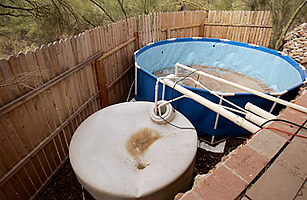
A gray water storage tank, left, and a 3,500-gallon pool are part of the rainwater system seen at in Tucson, Arizona.
Would you water your garden with what goes down your shower drain or out your washing machine? In Tucson, Arizona, and an increasing number of water-starved western cities, more and more residents are saying yes.
If you've never contemplated what happens to the water that gets you or your clothes clean, you're far from alone. But for cities and environmentalists trying to head off the growing threat of drought and rising water costs, so-called graywater — differentiating it from the "black water" that goes down the toilet — is getting a lot more attention. A decade ago, Tucson, which has about a million residents in its metro area and is a liberal and environmentally conscious oasis in a red state, convinced Arizona legislators to make it legal for homeowners to irrigate their trees and plants with the water that was going down their drains or out of their washing machines without a permit. Now, graywater use is not only legal in Tucson, and indeed the rest of Arizona, but promoted, and, in some cases, required. In 2007, the state rolled out a tax credit of up to $1,000 for homeowners who install graywater systems. Last year, a law — believed to be the country's first — went into effect in Tucson that requires builders to include graywater plumbing in new construction.
"If there are higher stages of drought, there will be more watering restrictions," says Ilene Grossman, who is the city water department's conservation program manager. "We're not at the critical stage right now, but we are planning for that."
There's not good data on how close our nation's cities are to a water crisis, or how many people are using graywater. But the picture is this: Climate change, the cost of water treatment and rising populations will eventually, if nothing is done, run some US cities, particularly western ones, dry. Tucson, for instance, is already in what's called stage one drought, which means it's too dry but not yet critical. If a worse drought were to occur, there would be restrictions on gardening. Outside of desert areas like Tucson, there's issues of climate change and the cost of building sewage treatment plants to accommodate an expanding population. "It's crazy that we do so much to get water, and then it gets dumped down the drain," says Laura Allen, a founding member of Greywater Action, who set up her own Oakland, California home's graywater system illegally and has advocated for California's recent rule changes.
A number of city and state legislatures are coming to the same conclusion. Depending on the climate and the size of the yard, graywater reuse can lower a household's total consumption by as much as 40%. In November, Pacific Institute, which is an influencing water conservation research group, said that graywater reuse was an important strategy in improving a city's water resiliency against climate change. At a time of tight budgets, increased graywater usage could reduce the need for cities to spend money on costly new water supply projects. "It's almost at the tipping point where there are more states in the west that have graywater regulations than those that do," says Val Little, director of the Water Conservation Alliance for Southern Arizona (Water CASA).